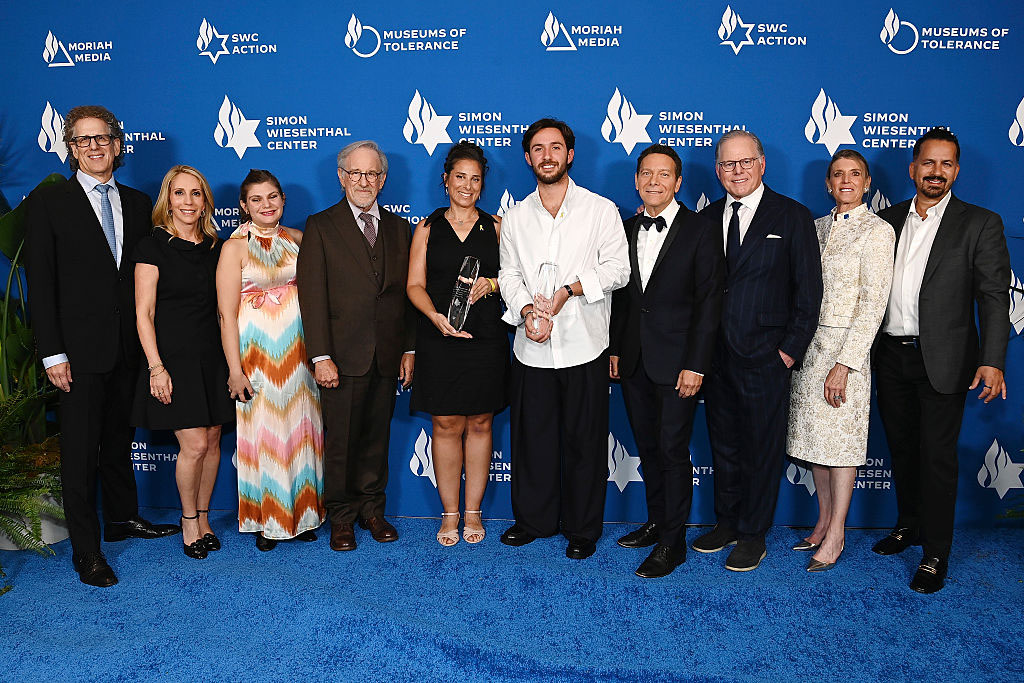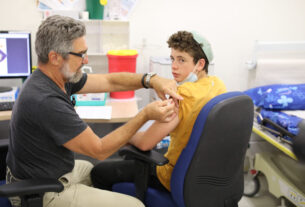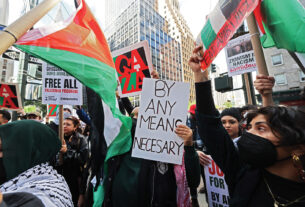The Simon Wiesenthal Center’s (SWC) 2025 Los Angeles Humanitarian Award Dinner on Oct. 30 brought together Oct. 7 survivors with journalists, studio heads and Academy Award-winning actors, directors and producers at the Beverly Wilshire Hotel.
The evening celebrated the reach and responsibility of the arts and journalism when it comes to confronting the ugliest parts of humanity. The most memorable image of the evening, however, was offstage, when director Steven Spielberg spent several minutes talking with Oct. 7 survivors Omer Shem Tov and Aya Meydan, who were both awarded a Medal of Valor.
Shem Tov was abducted from the Nova Festival and held hostage for 505 days in Gaza. He told the audience of over 500 people, “Oct. 7 marked a turning point in our lives, for us as a nation, as a people and for myself. The morning meant celebration and joy, a party with friends, and then in a single moment our entire world changed. From that moment on, nothing was the same. That night before, we were still kids dancing through life, but by the morning everything had shattered: innocence, our routines, sense of safety. Faced with unimaginable horror, we were forced to choose: to sink into the darkness or fight for the light.”
Since being released from Hamas captivity, Shem Tov has spoken about how one of his Hamas captors had asked what he wanted to be in life. When Shem Tov replied “actor,” the captor told him to do an imitation of his captor — so Shem Tov did an imitation. The terrorist captor laughed.
Aya Meydan, a triathlete from Kibbutz Be’eri, described surviving the attack with the help of Bedouin rescuers.
“At the worst moment of my life, a Bedouin family came to my rescue,” Meydan told the audience. “For nine hours, I hid with a total stranger, an Israeli-Arab who in that moment became my brother. The war that started that day is between Israel and Hamas, not between Jew and all Arab as some might think. Many of those murdered, kidnapped and kept in captivity by Hamas were not Jewish, and among them were Arab and Bedouin citizens who were also targeted. Israelis from all backgrounds suffered on Oct. 7, and we came together as one nation on that day. For me that happened under fire, as Hisham [Alkrenawi] and I hid together waiting for help. My rescue story is my moment of light.”
“The war that started that day is between Israel and Hamas, not between Jew and all Arab as some might think. Many of those murdered, kidnapped and kept in captivity by Hamas were not Jewish, and among them were Arab and Bedouin citizens.” – Aya Meydan
Spielberg, who presented Warner Bros. Discovery CEO David Zaslav with the Humanitarian Award, posed with Shem Tov and Meydan for photos prior to the ceremony. According to multiple people speaking on the condition of anonymity, Spielberg has been helping Israeli and Jewish relief efforts behind the scenes since the Hamas attacks. After Shem Tov and Meydan received their medals, there was a 30 minute break for dinner. During that time, Spielberg got up from his table where he was seated next to New England Patriots owner and Blue Square Alliance founder Robert Kraft. Next to Kraft was actor Dustin Hoffman. But for almost 10 minutes, Spielberg stood in conversation with Shem Tov.
A year ago, Shem Tov was cooking and being a servant for his terrorist captors in an underground tunnel in Gaza. On this night, he was sharing his story one-on-one with the greatest storytellers in cinematic history.
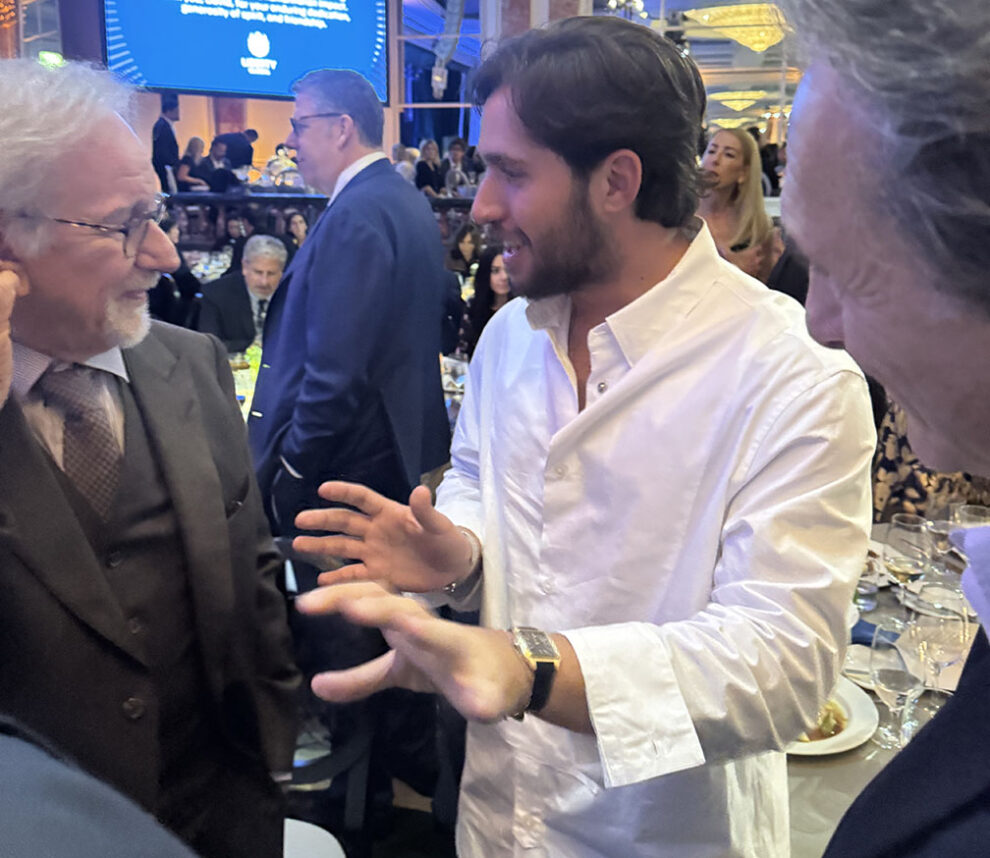
In 2015, Spielberg and Zaslav traveled together to Poland for a weeklong commemoration of the Holocaust. The trip marked the 70th anniversary of the liberation of Auschwitz. Spielberg and Zaslav co-chaired a committee called “The Past Is Present,” which brought about 150 participants to Poland, most of them survivors, their family members, and educators. By that time, Spielberg said, the youngest survivors were already 80 years old, giving the quest for remembrance even “greater urgency.” The visit to Poland, Spielberg said, renewed his and Zaslav’s mission that that remembrance requires testimony and education, and most of all, it also “requires persistence to have lasting impact on future generations.”
The Simon Wiesenthal Center, founded in 1977 and named in honor of the late Nazi hunter, describes its mission as confronting antisemitism, defending Israel’s legitimacy and promoting human rights through education and cultural engagement. Its flagship project, the Museum of Tolerance, is undergoing a $30 million modernization. CEO Jim Berk said that it includes new exhibits on migration and the modern forms of antisemitism, along with a renewed focus on storytelling through film and television. He said it will be “the largest permanent exhibition on antisemitism ever created.”
“Our mission is clear,” Berk said. “To confront hate, defend our people and build bridges of understanding.” He cited the Center’s new production arm, Moriah Media, and its latest project, a scripted series on HBO Max, “One Day in October.”
“Storytelling truly sets us apart,” Berk said. “‘One Day in October’ made it to the screen because of the courage and commitment of David Zaslav and the team at HBO Max.”
Also speaking at the gala was Dawn Aaron, chair of SWC’s Board of Trustees.
“We gather tonight to honor individuals whose courage and conviction dignify the memory and mission of Simon Wiesenthal,” she said. “Evil flourishes when good people do or say nothing.”
Singer-pianist Michael Feinstein performed songs from the American Songbook, including tunes by Jewish composers George and Ira Gershwin. He concluded the night with “Over The Rainbow” by Harold Arlen and Yip Harburg.
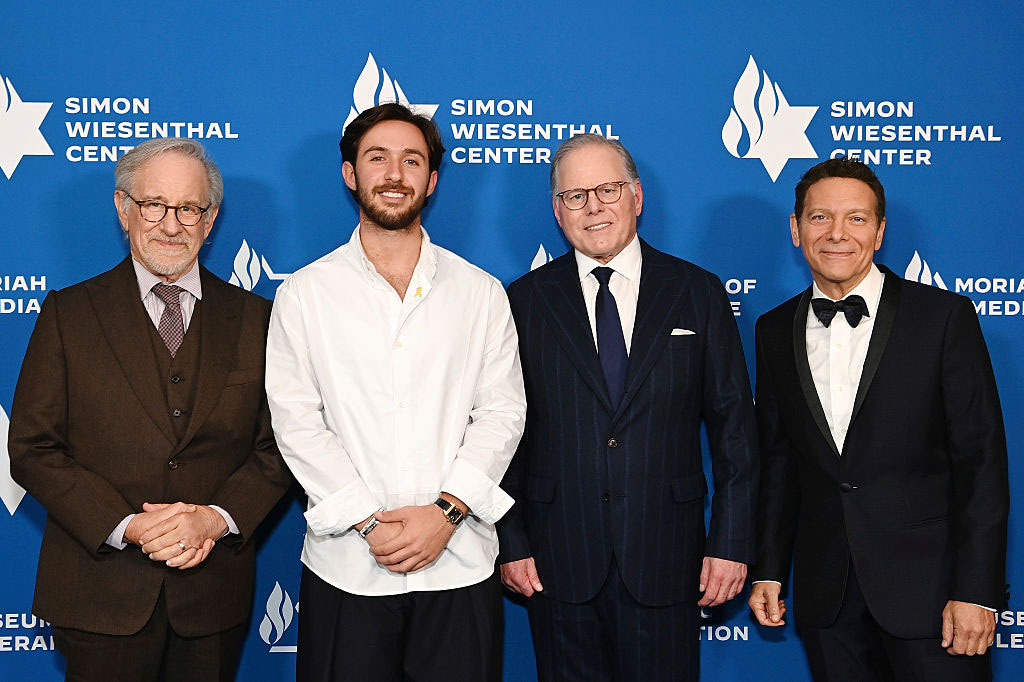
CNN anchor Dana Bash received the Jewish Heritage Award.
“It tells you a lot about the time that we’re in, that being a proud Jew in the media earns you an award,” Bash said. She recalled her visit to Auschwitz with colleague Wolf Blitzer, where her great-grandparents were murdered. (Blitzer also attended the gala.)
“It was life-changing, standing on the train track that brought my great-grandparents in a cattle car all the way from Hungary into the extermination camp,” Bash said. “Getting back to the truth is paramount. It’s not just a journalistic standard, it is a moral obligation.”
Jeffrey Katzenberg, who chaired the dinner, told the crowd that the event raised $4.3 million for the SWC. He described bringing Zaslav through the Museum of Tolerance before the gala.
“David went from being full of ideas, to deep the contemplation,” Katzenberg said. “Quietly, he reflected on his family’s history with the Holocaust and how vital it is to preserve memory and meeting for generations. He understood deeply that the exhibit allows people right here in Los Angeles to feel the enormity of that history.”
Zaslav recounted that his grandmother Ida was born in Warsaw to a large, educated Jewish family of 10 siblings. Her grandfather, David, had been a successful banker and president of the Hebrew Charitable Union of Warsaw. As antisemitism intensified, the family lost their livelihoods and were targeted for humiliation. Ida and her mother, Rachel, escaped Poland before the war, cutting their family portraits from their frames and rolling them into their sleeves. They were the only members of their family to survive; the rest were murdered in the Holocaust.
The portraits now hang framed in Zaslav’s Los Angeles home today. When he showed a photo, the crowd erupted in applause.
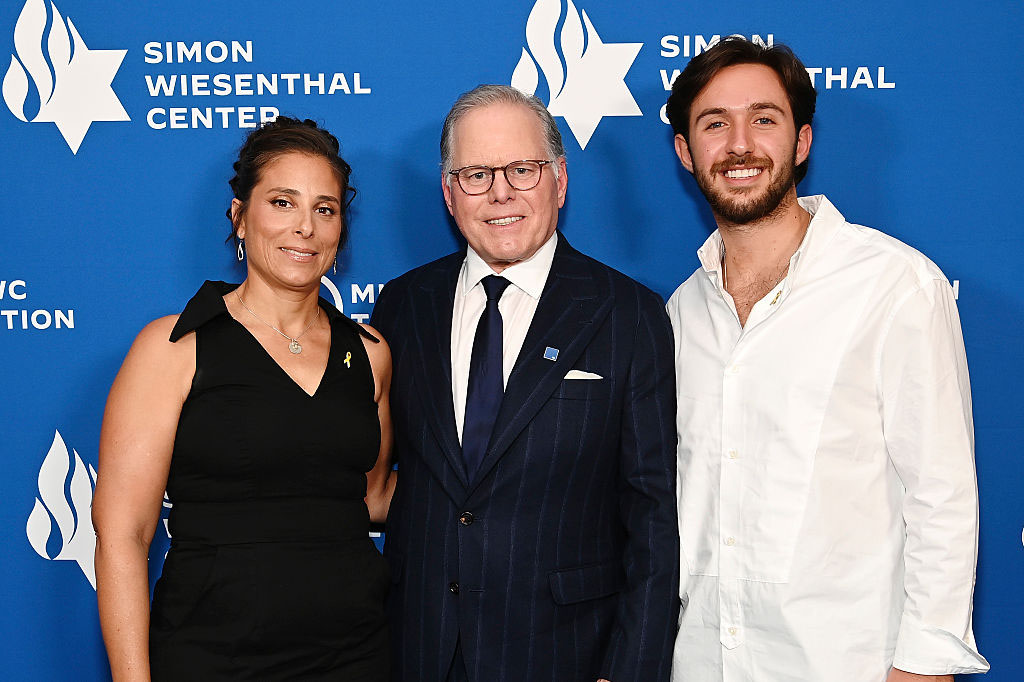
When Spielberg took the stage to introduce Zaslav, he showed a clip from “Casablanca” and recounted Warner Bros’.early opposition to Nazism. He described the four Warner brothers as Polish Jews who used movies to “confront Naziism, fascism and antisemitism.” Spielberg described David Zaslav as the son of immigrants who grew up learning the value of hard work and moral responsibility from his father, Gary, an attorney who spent years fighting discrimination. The crowd had a hearty laugh when Spielberg shared that Zaslav now occupies the same office once used by Jack Warner — where the television is always tuned to Turner Classic Movies throughout the workday.
“Hope alone is not enough,” Zaslav said. “We also need to stand up and have the courage to fight. What stories will we tell? That’s going to be our legacy.”
Among those in attendance were David Ellison of Paramount Skydance, Netflix co-CEO Ted Sarandos, Apple executive Eddy Cue and actors Jason Alexander, Noah Wyle, Susie Essman and Vin Diesel. Also present were comedians Elon Gold and Bill Maher, singer and influencer Montana Tucker, former Los Angeles Mayor Antonio Villaraigosa, producer Lawrence Bender, “One Day in October” director David Finkelman, and media comedian Chris Caresnone (known as “The Babka King”) with his creative partner Kareem “Mitzvah King” Wells.
For all the power assembled in the room, the moment that will remembered is the quiet exchange between a filmmaker who has spent his life captivating audiences and preserving memory and two people who survived unspeakable horror. The legacy of Simon Wiesenthal’s life’s work was on full display.

